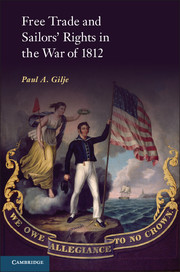21 - Remembering Impressment
Published online by Cambridge University Press: 05 March 2013
Summary
Despite the failure to mention impressment in the Treaty of Ghent, Americans continued to seek an end to the British practice of taking men from American ships after the war. Unlike the situation in the years leading up to the War of 1812, diplomats who discussed impressment with the British after the war were not fighting to protect the lives and rights of sailors who were immediately imperiled. Instead, they were concerned with more abstract issues and viewed impressment as a matter of principle concerned with defending the honor of the American flag. In a sense, the efforts to settle the question had little to do with Jack Tar himself, and were more centered on resolving a lingering diplomatic grievance that was a legacy of the omissions in the Treaty of Ghent. As such, the memory of impressment became entangled in a series of other questions that preoccupied American foreign policy, including a more general commercial treaty, ending the international slave trade, and the Monroe Doctrine.
American diplomats sought to settle the controversy over impressment in the spring of 1815. Shortly after signing the Treaty of Ghent, Albert Gallatin and Henry Clay headed for London to conclude the second part of their commission and obtain a commercial agreement with Great Britain. Only three of the five American commissioners at Ghent would be involved in these negotiations. James Bayard, who was ill, sailed for the United States only to die within a week of his arrival in Delaware. Jonathan Russell went to Stockholm, where he took up his duties as minister to Sweden. John Quincy Adams joined Clay and Gallatin on May 25, 1815, having been appointed the new minister to Great Britain. By that time it was clear that the British were not interested in discussing what they considered their right to impress the king's subjects from neutral ships. During their preliminary negotiations with Henry Goulburn and William Adams, two of the British commissioners from Ghent, and Frederick John Robinson, a member of the British Board of Trade, Clay and Gallatin suggested that the “first and most important point” concerning neutral rights was impressment. Since both sides were convinced that they held the moral high ground, “[i]t would…be unprofitable…to go into a discussion of the right.”
- Type
- Chapter
- Information
- Free Trade and Sailors' Rights in the War of 1812 , pp. 288 - 296Publisher: Cambridge University PressPrint publication year: 2013



